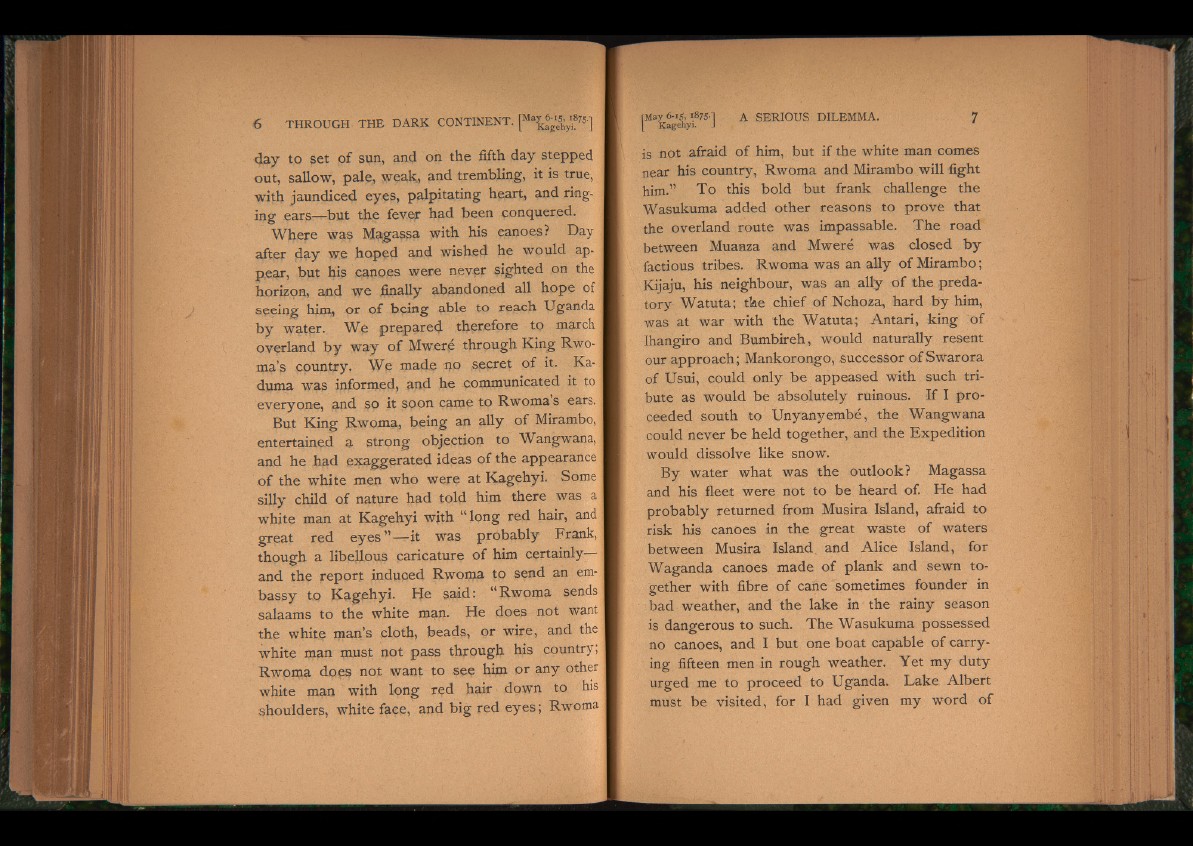
day to set o f sun, and on the fifth day stepped
out, sallow, pale, weak, and trembling, it is true,
with jaundiced eyes, palpitating heart, and ringing
ears— but the fever had been conquered.
Where was Magassa with his canoes? Day
after d ay we hoped and wished he would appear,
but his canoes were never sighted on the
horizon, and w e finally abandoned all hope of
seeing him, or o f being able to reach Uganda
b y water. Wp prepared therefore to march
overland b y w a y o f Mwere through King Rwo-
ma’s country* W e made no secret o f it. Ka-
duma was informed, and he communicated it to
everyone, and so it soon came to Rwomas ears.
But King Rwoma, being an ally o f Mirambo,
entertained a strong objection to Wangwana,
and he had exaggerated ideas o f the appearance
o f the white men who were at Kagehyi. Some
silly child o f nature had told him there was a
white man at K a g eh y i with “ long red hair, and
great red e y e s ” — it was probably Frank,
though a libellous caricature o f him certainly—
and the report induced Rwoma to send an embas
sy to K a g eh y i. l i e said: “ Rwoma sends
salaams to the white man. He does not want
the white man’s cloth, beads, or wire, and the
white man must not pass through his country;
Rwoma does not want to see him or any other
white man with long red hair down to his
shoulders, white face, and b ig red eyes; Rwoma
is not afraid o f him, but if the white man comes
near his country, Rwoma and Mirambo will fight
him.” T o this bold but frank challenge the
Wasukuma added other reasons to prove that
the overland route was impassable. T h e road
between Muanza and Mwere was closed b y
factious tribes. Rwoma was an ally o f Mirambo;
Kijaju, his neighbour, was an ally o f the predatory
Watuta; the chief o f Nchoza, hard b y him,
was at war with the Watuta; Antari, king o f
Ihangiro and Bumbireh, would naturally resent
our approach; Mankorongo, successor o f Swarora
of Usui, could only be appeased with such tribute
as would be absolutely ruinous. I f I proceeded
south to Unyanyembe, the Wangwana
could never be held together, and the Expedition
would dissolve like snow.
B y water what was the outlook? Magassa
and his fleet were not to be heard of. He had
probably returned from Musira Island, afraid to
risk his canoes in the great waste o f waters
between Musira Island, and A lic e Island, for
Waganda canoes made o f plank and sewn together
with fibre o f cane sometimes founder in
bad weather, and the lake in the rainy season
is dangerous to such. The Wasukuma possessed
no canoes, and I but one boat capable o f carrying
fifteen men in rough weather. Y e t my duty
urged me to proceed to Uganda. L a k e Albert
must be visited, for I had given my word o f